#indian deities
Explore tagged Tumblr posts
Text
Raja Ghepan: The Richest God of Lahaul and the Sacred Rath Yatra Tradition
#Ancient traditions#atal tunnel#chandra river#Himalayan Gods#Indian Deities#Indian mythology#King of Lahaul#Lahaul Culture#Lahaul Spirituality#Lahaul Temple#Lahaul Valley#Lahaul-Spiti#Protector God#raja ghepan#rath yatra#Richest God#Snow Desert
0 notes
Text

Krishna’s shenanigans
(ab toh maiiya se bachne ka no chance)
<Vasants version>
#desiblr#quality goes to hell when the video is converted to gif 💀💀💀#desi#being desi#desi tag#desi teen#desi tumblr#art#krishna ji#Krishna#krishnablr#kanha#gopiblr#hindublr#hindu mythology#hindu gods#hinduism#hindu memes#vishnu#hindu deities#hindu#desi indian#tumblr fam#desi aesthetic#desi core#desi culture#desi memes#desi side of tumblr#desiblr ki gopiyan#kanhaiya
255 notes
·
View notes
Text
Im soooo weak to when Bond is like casually being used or exploited at his expense for some ostensible Greater Good except the situation doesn't HAVE to come to that, not really, and he's so inured and even numb to it that he barely pays it any mind; meanwhile, Q absolutely minds and is very indignant on his behalf and works overtime to like either try to avert or forestall the situation before it gets to the point where Bond has to dig his own claws into more of his soft underbelly to offer up on the sacrificial alter of politics of all tawdry things, or to manufacture a way in which he does the needless "needful" so as to spare Bond at least one unnecessary additional wound upon his psyche.
bonus if Bond finds out and maybe after being angry or indignant about it - I don't need you to do my job for me, Q, this is what I'm here to do - and either Q tells him/lets slip or he deduces that like, this isn't Q thinking he can't get the job done, this is Q finding him precious and worthy of protecting, and like. he's just very in awe of that and does in fact feel very safe and cherished within the cradle of his Quartermaster's regard
#00q#of like... yes it's constant surveillance. but also it's like. constantly having a companion & constantly having an all-seeing eye#looking out for you and reaching out to influence your life#I'd imagine it's very like religion (*puts a Bond thought bubble on this*)#it's the Take Me to Church-ism of it all#lmao I didn't start this off as a web-weaving but now I'm weaving it into a web#but yeah in this fic - looked it up it's Playing the Part - this other rando agent is like. is he in your ear rn? the Quartermaster?#and the guy is like. I don't know how you handle it‚ being under his watch all the time. I know he's supposed to be your guardian angel but#I hope I never come to his attention‚ I don't want him to care enough to know a thing about me.#and it's sooo so interesting in the context of Q and this like. pathological need for omniscience we often assign him#cuz yeah it COULD be very oppressive and overbearing#but like. I think it complements Bond's Ambiguous Disorders a lot bc it WOULD read to Bond as Caring#like so much of his life doesn't belong to himself anyway so a lot of the puppeting is old hat#but what a novelty to have someone who does it not because they want something from him or because of what he can do for them#but because they care so deeply about *him* as to want to do right by him and look out for his well-being#also sidebar'ing back but like there's a lot stupid about Business English but 'do the needful' is probably one of if not THE dumbest thing#I've ever heard or seen in my life. like. absolute epitome of garbage bullshit bureaucracy-speak nonsense and I know I'm getting into dicey#territory cuz despite whatever origin it may have had it's seen more today as an Indianism. but still like in and of itself it's such#a dumb phrase. and speaks to such a height of bureacracy & it's like. you don't have to say it like that. there are other words you can use#okay anyway. back to 00q#somehow I've brought this into 'blasphemy but make it sexy. as a treat' lmao but yeah... Q as Bond's wrathful & jealous God....#WAIT another web weaving. Ulysses when Bond is like. no not a guardian angel. Q is his patron deity his household god. mm yes *chefs kiss*
133 notes
·
View notes
Text

#shakti#goddess#art#goddess art#goddess energy#goddesses#hindu art#hindu goddess#indian art#indian goddess#lotus#lotus flower#divine art#divine feminine#sacred feminine#lotus flowers#deities#deity art#deity#mother goddess
131 notes
·
View notes
Text

Lord Shiva, Mahadev, Bholenath, Adiguru 💙🔱
The best teacher of spiritual growth and transformation.
With his third eye, he sees beyond the illusions of the world, and his trident represents the power to destroy ignorance and ego.
His crescent moon is control of one's mind, and his serpent garland signifies the transmutation of poison, overcoming evil.
As the destroyer of the universe, he teaches us that transformation is necessary for rebirth and renewal.
With his teachings, we can learn to embrace change, let go of attachments, and find inner peace in the midst of chaos.
#lord shiva#mahadev#hinduism#desiblr#indian witch#yoga#kundalini#guru#spiritual growth#spiritual guidance#spiritual awakening#chakras#third eye#psychic#deity#quotes#spirituality#spiritualgrowth#spiritual journey#witchcraft
103 notes
·
View notes
Text

Vishnu
A wonderful tribute.
Source
Creator: Sparkytron
#lego#bionicle#deity#god#india#indian#indian god#cloth#multiple limbs#multiple arms#four arms#gold#golden#trimurti#cloak#preservation#rainbow#vishnu#bottle#flower#discus#scepter#robe#hinduism#blue#blue skin
38 notes
·
View notes
Text

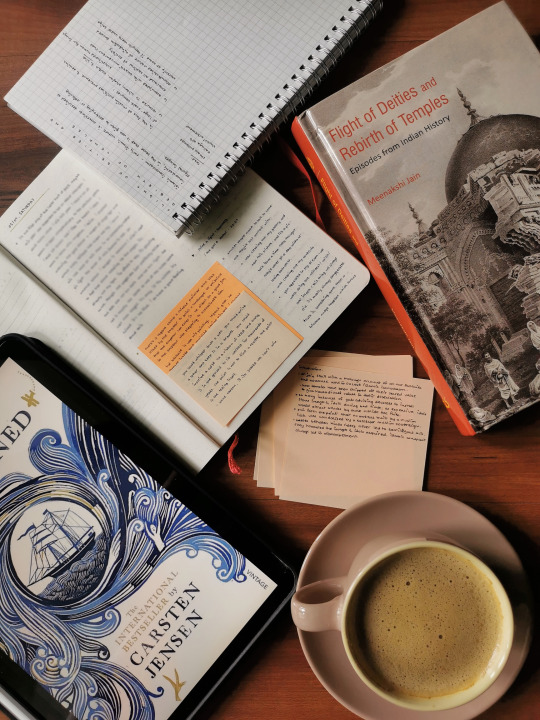
currently reading (at snail’s pace)
i’ve never juggled between such vastly different, yet equally heavy genres before. one boggles my mind with yet another unexplored aspect of indian history, another makes me realise how little i know about the world, and the last one could’ve just been a twitter thread.
“we said goodbye to our mothers. they’d been around all our lives, but we’d never properly seen them. they’d been bent over washing tubs or cooking pots, their faces red and swollen from heat and steam, holding everything together while our fathers were away at sea, and nodding off every night on the kitchen chair, with a darning needle in hand. it was their endurance and exhaustion we knew, rather than them."
- we, the drowned by carsten jensen
#booklr#studyinspo#studyblr#light academia#book blog#books#dark academia#indian history#designblr#flight of deities and rebirth of temples#meenakshi jain#we the drowned#carsten jensen#ruined by design#design ethics#non fiction#study inspiration#studying#indian literature#self study
240 notes
·
View notes
Text
You've heard of "and there was only one bed", now get ready for
"and there was only one pot, which we both ejaculated into because we're male Hindu deities whose friendship was so strong that the modern Sanskrit word for friend evolved from our name; we govern the phases of the moon through the power of gay sex; and we ride together in a chariot pulled by swans. Also we co-fathered two sons from the semen pot."
#we are talking about Mitra and Varuna in case that wasn't clear#absolutely iconic ancient Indian deities who honestly ruled#and before anyone starts - this post is obviously a simplified and tongue in cheek take appropriate for the platform we are sharing it on#genuinely though i really loved researching these two#mitra and varuna#mitra#varuna#lgbtq history#queer history#listen to episode 11 of Queer at Last if you want to know more about these two btw!
8 notes
·
View notes
Text
Do any pagans here worship/work with any Hindu deities?
#I'm Indian and haven't really thought about working with any before#I have a couple who I would absolutely be open to working with#But I've only seen one or two posts about this#witchblr#deity work#witchcraft#deity worship#paganblr#witch#pagan witch#paganism#pagan
14 notes
·
View notes
Text





My insta: https://www.instagram.com/oaremn/
#my artwork#artists on tumblr#my art#mythology and folklore#greek tumblr#greek mythology#greek myth art#traditional art#oil paints#mixed media#drawings#greek deities#pandora's box#helios#atlas#Penthos#demeter#i mixed traditional and street art styles#does it work?#some of the art works are very detailed#and i hope you all appreciate ghe frustration that went into this#some of the styling crosses from greek/roman into indian.#i cant see it#but thats what ive been told.#so indian mythology#indian mythology#street art#let me know what you think
7 notes
·
View notes
Text

Pavanputra by Satish Gupta
#Hanuman#Hindu deities#Hindu God#Pavan Putra#Hindu religion#Hindu mythology#Hinduism#Satish Gupta#Indian art
14 notes
·
View notes
Text
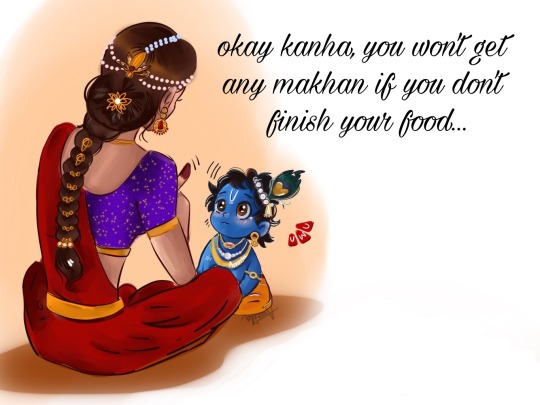
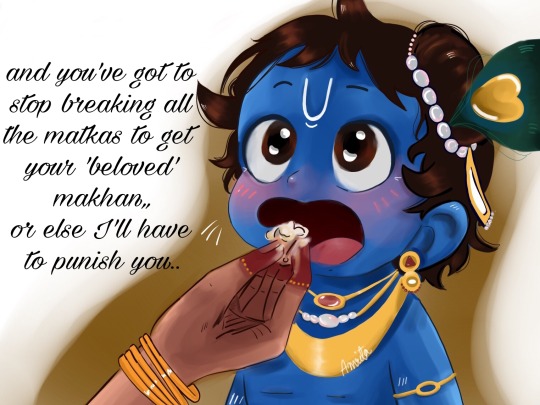

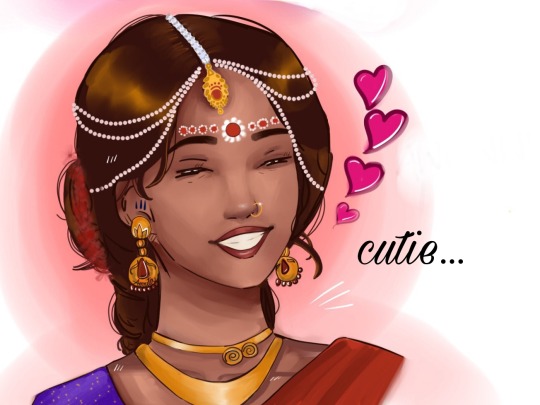
Yashoda maiyaa can never be mad at her kanhu for more than a minute 🥹
Happy Birthday to our sweet, precious 'Momma's Boi'.
HAPPY JANMASHTAMI!!!
#heheh#Janmashtami#y'all should know i dont really know how to....digital art? what#krishnablr#kanhaiya#krishna ji#gopiblr#kanha#desiblr ki gopiyan#krishna#kanhaji#desi tumblr#desiblr#being desi#desi tag#desi humor#hindublr#art#hinduism#hindu god#hindu gods#hindu deities#hindu#digital painting#comic#desi indian#desi girl#desi life#desi aesthetic#desi
788 notes
·
View notes
Text
Indians in the Greek epic Dionysiaca
1. Astraëis/Aristaeis: Led the first Indian contingent against Dionysos.
2. Cyllaros: Brother of Astraëis
3. Brongos: Father of Astraëis and Cyllaros, and honored by Deriades.
4. Hydaspes: Son of Thaumas and Elektra/Okeanos and Tethys, and (possibly twin) brother of Iris. He had horns for some reason. (River Jhelum)
5. Astris: Lover of Hydaspes, daughter of Helios and Ceto (a Naiad daughter of Okeanos)
6. Ganges: Son of Okeanos and Tethys (River Ganga)
7. Akesines: River Chenub.
8. Deriades: An Indian king, son of Hydaspes, grandson of Phaëthon (apart from Hydaspes' parents). He had horns too, just like his dad.
9. Orontes: Son-in-law of Deriades. After he threw himself into a river, that river came to be known as the Orontes River.
10. Thureus: Led the second Indian contingent against Dionysos.
11. Morrheus Didnasides: Another son-in-law of Deriades, and brother of Orontes.
12. Didnasos: Father of Morrheus and Orontes.
13. Hyssacos: Morrheus's servant.
14. Orsiboe: Deriades' wife.
15. Cheirobie and Protonoë: daughters of Deriades (Cheirobie, possibly the wife of Morrheus and Protonoë the wife of Orontes)
16. Modaeus: New Governor of India after Deriades' death.
17. Eulaios: Possibly a dead king
18. Agraios and Phlogios: Sons of late Eulaios
19. Palthanor: Leader of the tribe Zabioi, who hated Deriades for some reason and hence sided with Dionysos, who, after the war, took him and made him settle in Thebes.
20. Phringos, Aspetos, Danyclos and Hippuros Horsetail: Leading chieftains (along with Morrheus) of the tribe Uatocoitai, or the Ear-Sleepers, who, as the name suggests, slept lying upon their long ears...
21. Tectaphos: A farshooter, held prisoner by Deriades.
22. Eërië: Tectaphos's daughter, who breastfed him coz he was almost about to die of starvation.
23. Habrathoös: Some guy who got mad coz Deriades chopped off his beautiful hair. Joined Deriades' army unwillingly and secretly fought for Dionysos by sending him Deriades' plans at night.
24. Ginglon, Thyraieus, Hippalmos: Some more leaders, idk.
25. Tarbelos: A javelineer.
26. Thyamis and Holcasos: Sons of Tarbelos, who also led the Cyraioi, a seaside tribe.
27. Pyloites and Billaios: Sons of Hippalmos.
28. Rhigbasos: Another leader of a certain group of men.
29. Aretos: Another dude... (worshipped the Greek Gods)
30. Lycos and Myrsos (twins perhaps), Glaucos, Periphas, and Melaneus (the lateborn): Sons of Aretos. They were born mute but Dionysos, possibly after the war, took pity on them and fixed the issue.
31. Laobië: Wife of Aretos.
32. Corymbasos: Another chief of the Indian army.
#greek mythology#greek myths#greek epic#dionysiaca#ancient greek mythology#greek myth retellings#classical mythology#nonnus#dionysus#dionysos#dionysus deity#bacchus#greek gods#epics#desiblr#desi tumblr#desi tag#desiposting#desi side of tumblr#indian tumblr#desi
33 notes
·
View notes
Text
Tapati, who is she, and why is she significant?
Well, first, she is a river goddess, but daughter of the sun god, Surya. However, her name means the hot one, the burning one. Interestingly enough, her name is tied to the river she's said to rule over - HOWEVER, language time.
Agni, a vedic fire god, has a scythian counterpart similar in name (and the scythian's are the older culture that broke off to form the vedic, indo iranian/iranian, and levant people as well as others - mixing, breeding, invading).
Back to Tapati.
Her name is cognate with the Scythian supreme fire goddess, Tabiti. Very interesting.
Tabiti is the supreme goddess of all things in the Scythian culture, primordial, the first flame, and much like Ianna (from Summerian mythology I talked about later) went on to inspire entire god/goddess roles, and had mantles inverted as interestingly enough, there's evidence some first/supreme deities were feminine, later flipped to male as cultures evolved - their places/roles attributes assigned to male gods and their places changed - made wives, daughters, so on a similar sort of flipping happens out of the Scythian culture/ proto Indo Europeans (that I've talked about) where the root word for a divine (doesn't mean good just divinely powered) being evolved along languages the ahura, asura, and asir (Norse) come from an older proto Indo-European/Scythian word.
In the Vedic stories, the daevas are good, the asura evil. In the Avestan and Iranian texts...the ahura/asura are good, and the daevas are evil.
We know the Norse asir and vanir warred also very interesting. And interesting how gods/goddesses are changed, subsumed, adopted and more, no? Tabiti was never represented in/by art, btw. Her representation was always an actual fireplace -- a flame. That's what you used.
There's historical written evidence in places of Agni's animal form being both referred to as a bull, AND a cow in places - different genders. And his flame being referred to as female in places.
In the Hindu bronze age, Agni had way more of a prominent role as fire did before later dwindling...as fire does (ooooo symbolic - okay that's just cuz of time and shifting priorities), but there are more similarities of these things in Baltic cultures -- but oh why?
(Why am I hopping around? Cuz gods/goddesses, archetypes, beats, stories all do too - all connected you muppets).
Well, did you know the closest cognate to Sanskrit is Lithuanian? It's kept so much of its proto Indo European roots.
Wait, a South Asian language and Baltic European language are cognates? YUH. WEIRD.
Almost like they both derived out of an older culture, language, their practices, beliefs and more.
And most of human history is just migrating, fucking, invading, and settling in new places and staying long enough until your features continue to change due to bow chicka wow wowing and environment.
Funny how that works.
Here's some Scythian clothing (oh btw, women were warriors/could be too - congrats you learned that).
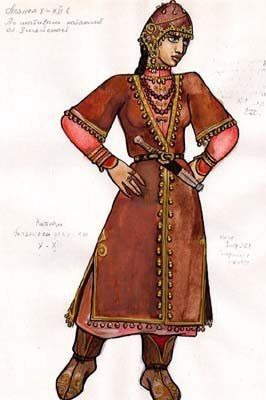
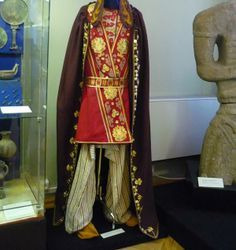
Does this style look familiar? Yeah, you can see the evolution/adaptation from this to later styles (bearing similarities) in Iran, India, Mongolia, the Baltics.
Cuz....y'know, that's where the proto Indo Europeans went about their biz and got jiggy with it and settled. Wow-wow-wee-wah! Okay now I'm done. Circular ish convo to get there but started with a fire goddess, it's relevant, but it all comes back to this.
Btw, this is also an important lesson for fantasy authors.
Because of all these connections and how old a bad ass fire goddess is, many of the oldest cultures are regarded as fire worshippers (like the Zoroastrians) did you know some keep an eternal burning flame? -- one is in Udvada Gujarat in India.
This flame has been said to have been kept burning for 1,500 years.
FIFTEEN HUNDRED.
And again, while most of the surviving Indo Iranic sun gods are male, there is evidence the ORIGINAL sun deity (including in/from the German, Baltic, and Slavic religions) was FEMALE.
#Tapati#sun god#sun goddess#Scythian culture#first gods were female#womens history#female history#proto indo european#indo european#Indian#Hindu#Baltic history#European history#deity worship#asian mythology#myths and legends#mythology#folklore#religions#religion changes things#ancient world#ancient history#ancient culture#did you know#fun fact#long thread#fantasy writers#fantasy authors#fantasy books#an important lesson
8 notes
·
View notes
Text
looking for some advice/insight
does leaving milk specifically, out as an offering for passing spirits, have any symbolism/meaning/spiritual significance?
please let me know your thoughts and opinions on this and possible interpretations
#witchcraft#witchblr#witch#spirits#spirit work#wicca#pagan#indian witch#hindu witch#magic#spirituality#energy work#deity work#witch community#divination#psychic#tarot#spirit worker#witchy#witchcore#baby witch
74 notes
·
View notes
Text
Recently felt compelled to buy this and then I did some channeling and Lord Lucifer seems to have requested it for his altar.
It's a candle holder with lips 🤣.
(He speaks of symbolism. "The time to speak and be heard has come." )
Burning a red candle since our Lord has a preference for red candles in my altar spaces.

#lord lucifer#witchblr#channeling#deity work#luciferian witch#offering#he also wants me to charge an antique set of earrings i got on his altar#he's got a lot of fancy designer stuff from all over the world. even an antique porcelain japanese sake bottle and a jade indian elephant#i travel and do antiquing as well so its easy to get him nice things on a budget#he also loves it when you drink tea with him#i left black tea on his altar and also gave mulled wine. he likes them both#lucifer
7 notes
·
View notes